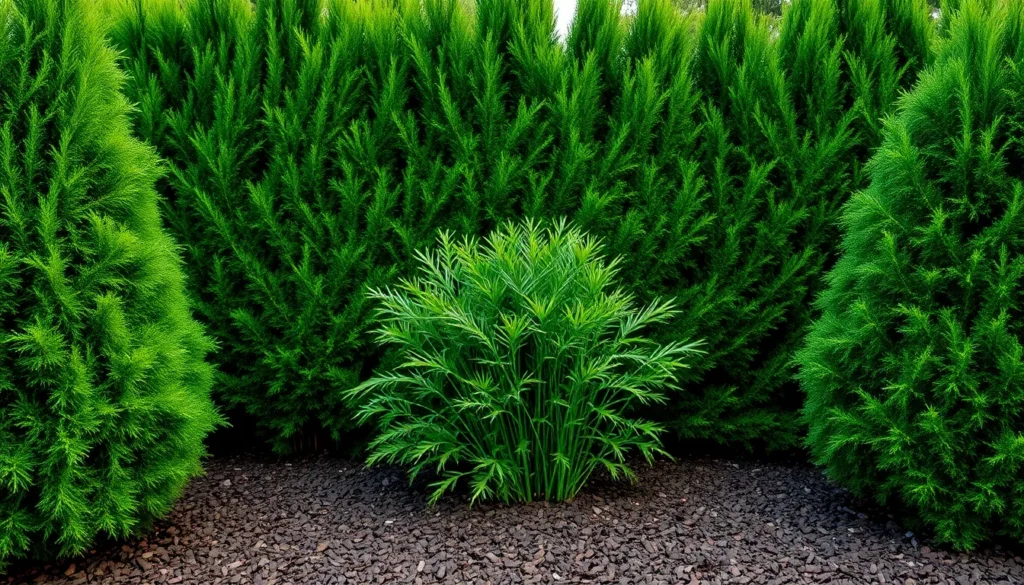Imagine transforming your backyard into a serene oasis, a private retreat shielded from the outside world by a lush, green tapestry. Whether you’re just beginning your gardening journey or have a well-worn pair of gardening gloves, “Best Plants for Privacy in Your Backyard” is your key to creating a secluded paradise right outside your door. This guide is crafted with care to offer you a selection of plants that not only beautify your space but also serve the practical purpose of enhancing your privacy.
In this collection, you’ll discover a variety of plants tailored to suit different climates and garden styles, proving that anyone can cultivate a thriving, private sanctuary. From towering evergreens to fast-growing shrubs, these selections promise to deliver both aesthetic appeal and functional benefits, such as noise reduction and wind protection. With each plant carefully chosen for its ability to transform your garden into a private haven, you’ll feel the joy and satisfaction of watching your living wall flourish over time. Dive into this guide with confidence and excitement, knowing that success is within your reach, and soon you’ll be enjoying the rewards of a beautifully secluded backyard haven.
Leyland Cypress (Fast-Growing Evergreen)
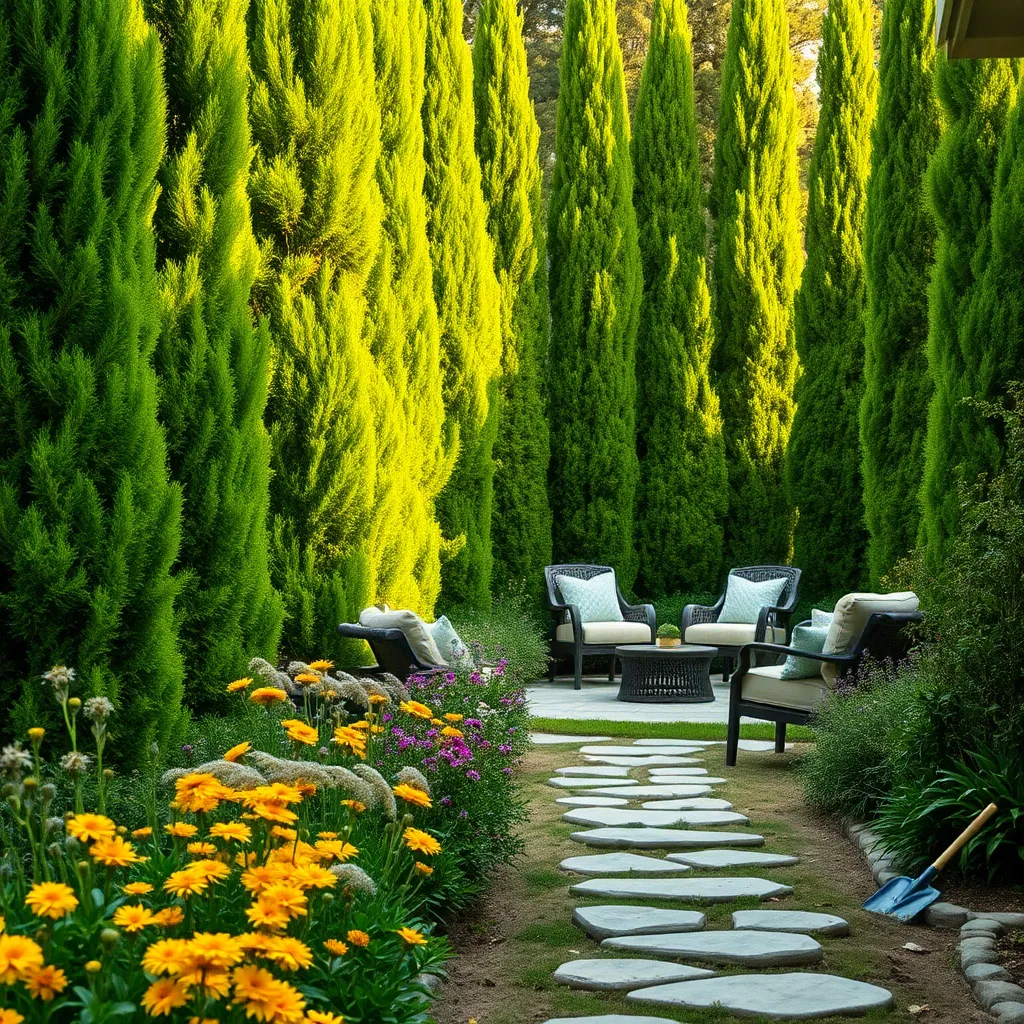
The Leyland Cypress is a popular choice for those looking to create a fast-growing, evergreen privacy screen in their backyard. It can reach heights of up to 60 to 70 feet, making it ideal for quickly establishing a natural barrier.
Plant Leyland Cypress trees in well-draining soil and ensure they receive full sun for optimal growth. These trees prefer acidic to neutral soil, so consider conducting a soil test before planting to adjust the pH as needed.
Watering is crucial in the first few years to help the trees establish a strong root system. Once established, they are quite drought-tolerant, but during prolonged dry spells, a deep watering every two weeks can prevent stress.
For best results, space the trees about 8 to 10 feet apart to allow them room to grow while maintaining a dense privacy screen. Regularly trim the tops and sides to encourage bushier growth, which helps maintain a thick, green wall.
Bamboo Screening (Quick and Dense Coverage)
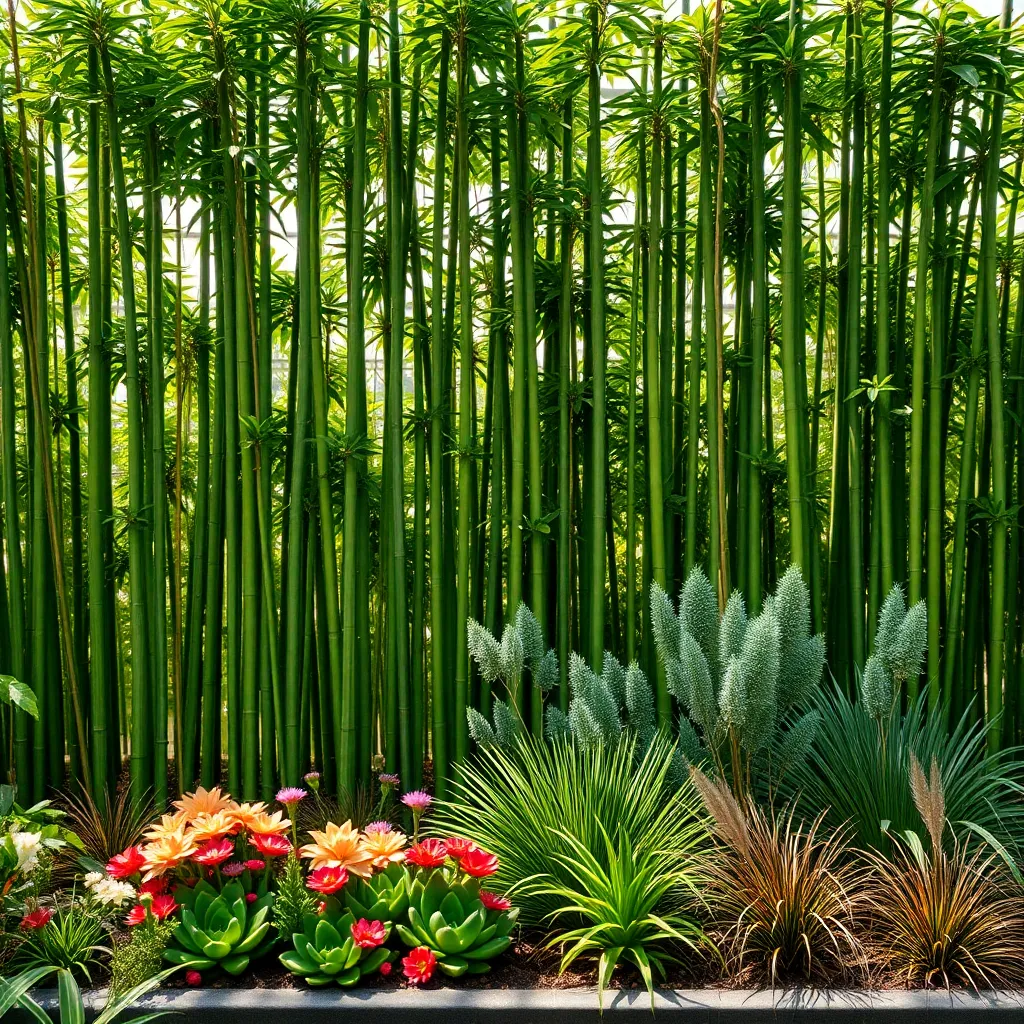
For those seeking quick and dense coverage, bamboo screening offers an excellent solution. This plant is known for its rapid growth and ability to create a lush privacy barrier in a short amount of time.
When planting bamboo, choose a species suitable for your climate, such as Fargesia for cooler regions or Bambusa for warmer areas. It’s important to plant bamboo in well-draining soil to prevent root rot and promote healthy growth.
To encourage dense growth, water bamboo regularly, especially during dry spells, ensuring the soil remains consistently moist but not waterlogged. Adding a layer of organic mulch can help retain moisture and provide nutrients as it breaks down.
For optimal results, fertilize bamboo with a high-nitrogen fertilizer in the spring and early summer. Pruning is also essential; regularly trim the tops to encourage bushier growth and maintain the desired height for privacy.
Holly Bushes (Year-Round Privacy with Berries)
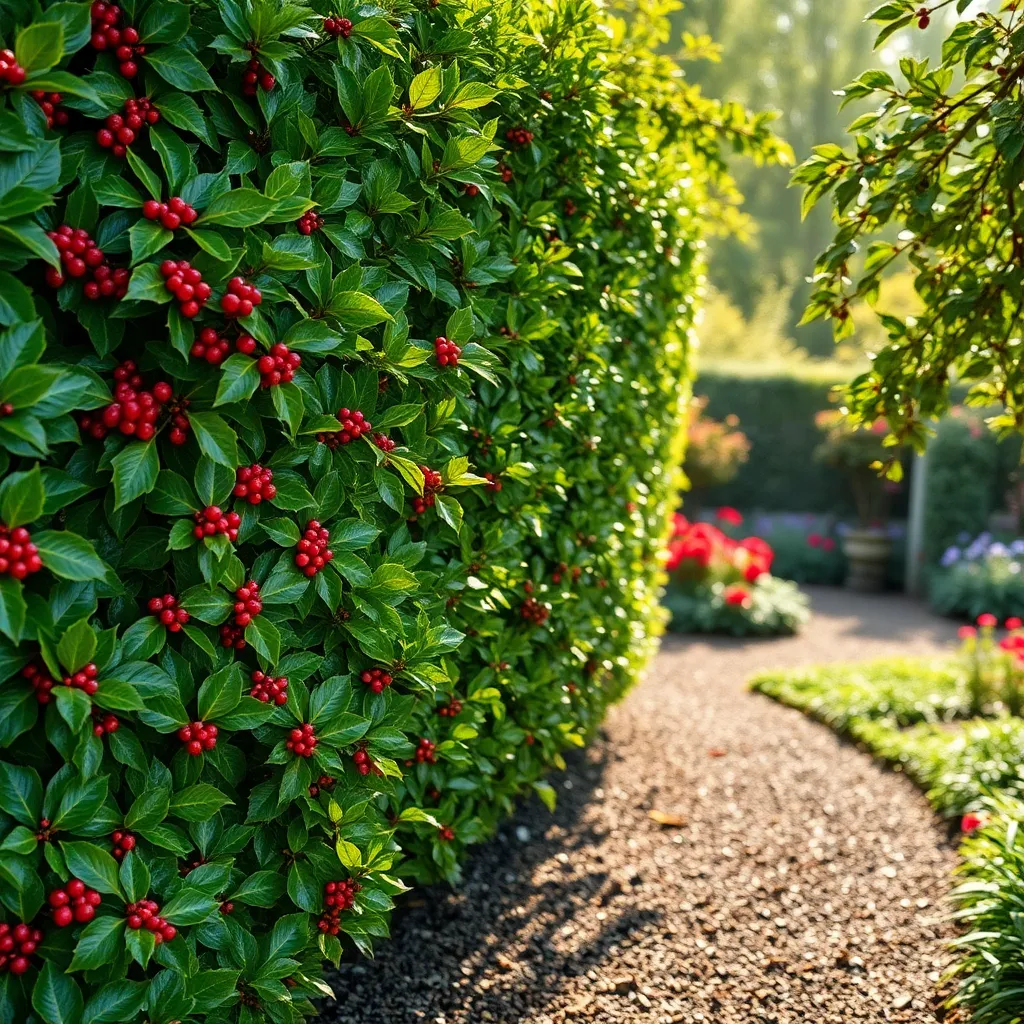
Holly bushes are an excellent choice for those seeking year-round privacy in their backyard. With their dense foliage and vibrant berries, they not only provide a visual barrier but also add a splash of color to the landscape.
These bushes are evergreen, meaning they retain their leaves throughout the year, offering consistent coverage. To ensure optimal growth, plant them in well-drained, slightly acidic soil and ensure they receive at least six hours of sunlight daily.
Watering holly bushes requires balance; they need regular watering, especially during dry spells, but overwatering can lead to root rot. It’s beneficial to apply a layer of mulch around the base to retain moisture and regulate soil temperature.
For gardeners looking to enhance berry production, consider planting both male and female holly bushes, as they require cross-pollination. Prune them in late winter to early spring to maintain their shape and encourage dense growth, keeping your privacy intact.
Privet Hedge (Versatile and Trim-Friendly)
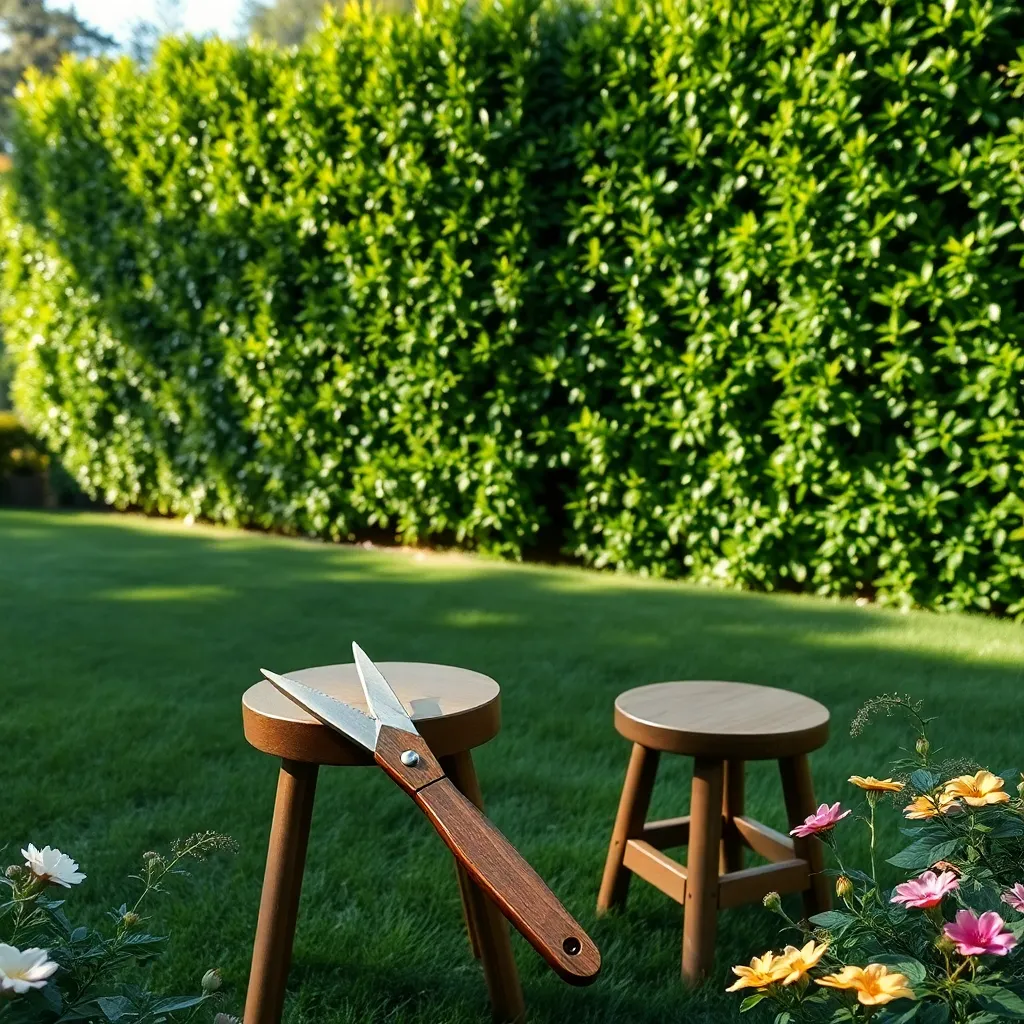
Privet hedges are a fantastic choice for those seeking a versatile and easily maintainable privacy solution in their backyard. Known for their dense foliage, privets can create a lush, green barrier that effectively blocks out noise and prying eyes.
One of the key advantages of privet hedges is their ability to thrive in a variety of soil types, including clay, loam, and sandy soils. To ensure optimal growth, aim for a planting area with well-drained soil and full to partial sunlight.
Regular pruning is essential to maintain the desired shape and density of your privet hedge. Trim them in late spring after the initial growth spurt, and again in mid-summer if needed, using sharp pruning shears to encourage healthy regrowth.
Watering should be consistent, especially during the first year after planting to help establish the roots. Once established, privets are relatively drought-tolerant, but they will benefit from occasional deep watering during prolonged dry spells.
Climbing Roses (Flowering Trellis for Added Height)
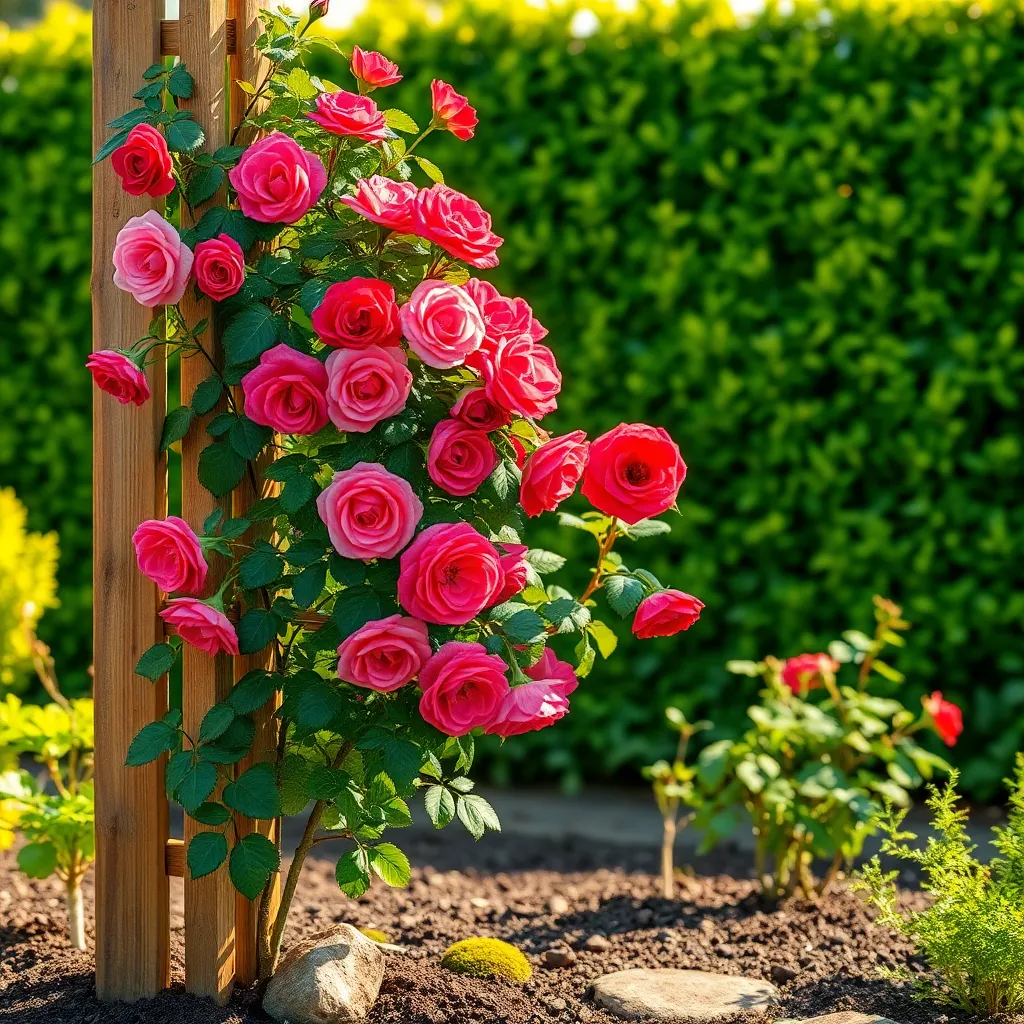
Climbing roses can transform your backyard into a delightful sanctuary while providing excellent privacy. These roses are perfect for covering trellises, offering both visual appeal and a natural screen from neighbors.
For optimal growth, ensure your climbing roses receive at least six hours of direct sunlight daily. They thrive in well-draining, loamy soil enriched with organic matter like compost.
Regular watering is crucial, especially during dry spells, but avoid soaking the foliage to prevent fungal diseases. Aim to water deeply at the base, maintaining a consistent moisture level in the soil.
Pruning is essential for encouraging healthy growth and abundant blooms. In late winter or early spring, trim back dead or weak stems and tie new canes to the trellis for support.
Advanced gardeners might consider grafting techniques to combine different rose varieties for a unique display. Additionally, applying a balanced, slow-release fertilizer in early spring can boost growth and flowering.
Conclusion: Growing Success with These Plants
In exploring the best plants for backyard privacy, we delved into five key concepts that mirror the nurturing aspects of relationships: choosing the right foundation, understanding growth patterns, prioritizing maintenance, fostering resilience, and celebrating diversity. Just as selecting the right plant can create a haven of privacy, building a strong relationship foundation ensures a harmonious environment. Recognizing growth patterns, both in plants and relationships, allows us to adapt and flourish together. Regular maintenance, through open communication and care, prevents misunderstandings and promotes longevity. Embracing resilience helps weather the storms, and celebrating diversity brings vibrancy and richness to our lives.
Take immediate action by selecting one plant from our list to enhance your backyard privacy, symbolizing your commitment to nurturing your relationships. Bookmark this article as a valuable resource to revisit these principles whenever you seek to strengthen your bonds. Remember, tending to relationships, like cultivating a garden, requires patience and dedication. As you look forward, envision a thriving partnership built on understanding and mutual support. With these insights, you’re empowered to cultivate connections that grow stronger with time. Save this guide as your go-to resource for maintaining privacy and intimacy in the lush garden of your relationships.

